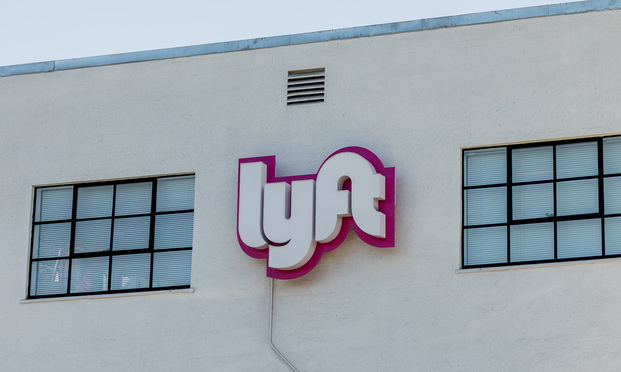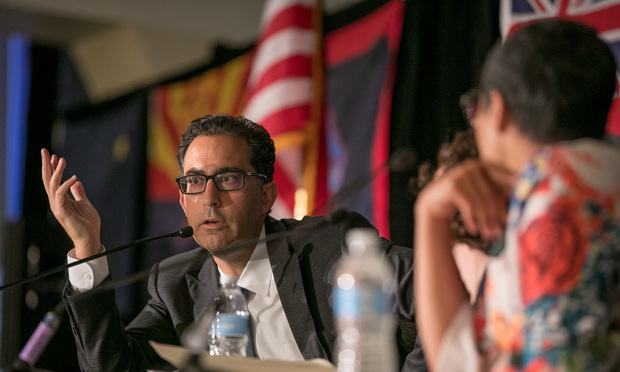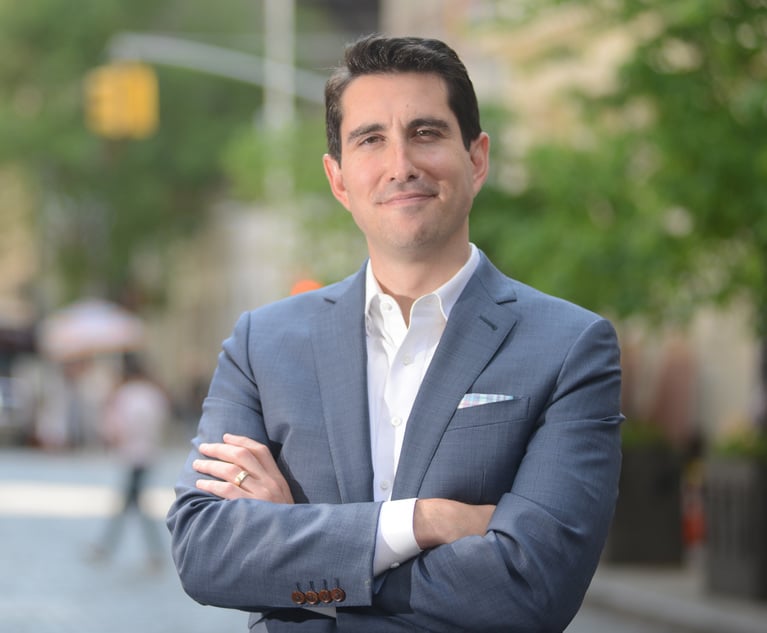Judge Reluctant to Designate Lyft Drivers as Employees Amid Pandemic, Despite 'Obvious' Worker Misclassification
The judge questioned whether Lichten & Liss-Riordan's Shannon Liss-Riordan was using the COVID-19 pandemic to overcome previous attempts to get her clients reclassified as employees.
April 02, 2020 at 05:37 PM
6 minute read
 Lyft driver lounge called the Hub. Located at 2300 26th Street in San Francisco
Lyft driver lounge called the Hub. Located at 2300 26th Street in San Francisco
A federal judge asked a lawyer representing a class of Lyft drivers if she was trying to use the COVID-19 pandemic to get her client's reclassified as employees after failing to do so during past attempts.
U.S. District Judge Vince Chhabria of the Northern District of California posed the question to Lichten & Liss-Riordan's Shannon Liss-Riordan in a Zoom video conference Thursday on an emergency motion she filed.
Liss-Riordan said the motion, which seeks to reclassify drivers as employees to take advantage of up to three days of state-mandated paid sick leave, would contribute to reducing the spread of the coronavirus crisis.
Chhabria asserted that "barely qualifying for paid sick leave" doesn't seem like the main purpose of the motion.
"In the grand scheme of things, considering everything else going on in the country, is it fair to say that you're using this as a hook to finally get Lyft to reclassify their drivers?" he asked. "That is an important issue, and that really does matter a great deal for drivers and the company, but it kind of seems like you're using this to get in and get a court ruling you haven't been able to get."
In a tentative ruling issued Monday, Chhabria said the claim for a public injunction should be remanded to state court and that "this is not the type of case where it would be appropriate to consider a preliminary injunction motion without first considering the motion to compel arbitration." He also granted a motion to compel arbitration on individual claims, but "the class action claims should be stricken because the plaintiffs waived the right to bring them."
In the hearing, he asked Liss-Riordan to focus on why Lyft drivers need to qualify for California paid sick leave instead of taking advantage of federal relief. Chabbria suggested she skip arguing that the company misclassifies its employees under Assembly Bill 5 and the California Supreme Court's Dynamex Operations West v. Superior Court decision, since he already agrees with her on that.
"That's not what this emergency motion is about," he said. Chabbria said the motion is about whether it's necessary for the court to reclassify drivers on an accelerated schedule so that they can qualify for paid sick leave, in spite of the arbitration clauses and class action waiver.
"It's obvious that AB 5 applies by its terms to Lyft drivers and that it's intended to apply to companies like Lyft, and that companies like Lyft who are refusing to reclassify workers despite the passage of AB 5 are really disregarding the rule of law, but that's not what this emergency motion is about," Chabbria said. "I think you should stop speaking in terms of Lyft's obligation to reclassify its drivers, it obviously has an obligation to reclassify workers."
 U.S. District Judge Vince Chhabria of the Northern District of California
U.S. District Judge Vince Chhabria of the Northern District of CaliforniaThe judge also took issue with a Lyft driver's declaration, which noted he would continue driving "fever or no fever" to feed his children. Chhabria said that 6.6 million Americans filed for unemployment last week, and that restaurant workers, housekeepers and all sorts of workers are experiencing a tremendous loss of income. He asked if it's more important to the driver to make a few bucks than risk killing his passengers.
Under normal circumstances, the judge said he understands that low-income individuals are faced with competing interests to work while sick … But if he has coronavirus symptoms, doesn't he have a moral obligation to stay home that supersedes whatever small amount of money he would be able to make?" Chhabria said, noting the low demand for rides amid shelter-in-place orders. "Doesn't he have a moral obligation to put himself in the same boat as the millions of people who can't work and rely on federal aid?"
Chhabria appeared unconvinced that granting the motion would provide greater relief than drivers would receive from the federal protections under the Family First Coronavirus Response Act, or the CARES Act, that are available to independent contractors.
Liss-Riordan said it's "entirely speculative" that just because drivers were considered employees under California labor codes that they would qualify as employees under less-stringent federal tax law and lose access to federal relief.
Chhabria said that her argument "couldn't possibly be right," adding it was clearly not the intent of Congress to distribute those federal benefits to people who are employees under California law and treated as employees by their employer, who would surely withhold the federal taxes that are owed.
"You're creating unintended consequences for the people you purport to represent if they get reclassified under California law and get treated as employees under California law that they would not have this tremendous benefit available to them as independent contractors," he said to Liss-Riordan of the federal assistance laws.
The judge also asked Keker, Van Nest & Peters' R. James Slaughter what Lyft was doing to help all of the drivers who lost a significant amount of their business in the crisis. Slaughter said Lyft was providing assistance to drivers who had provided documentation from public health authorities saying they could not work. But Slaughter said he is not sufficiently familiar with all the steps Lyft was taking to increase rider demand and help drivers in terms of loss of income.
On an identical motion in front of U.S. District Judge Edward Chen of the Northern District of California on behalf of Uber drivers, Chen told Uber's Gibson, Dunn & Crutcher attorneys and Lichten & Liss-Riordan to negotiate a temporary policy that allows workers to take paid time off without having to get a doctor's note for those who do not have access to overburdened and sometimes costly health care providers.
In that case, Chen said he was "troubled with" sidestepping precedent and process by granting the mandatory injunction ahead of class certification.
NOT FOR REPRINT
© 2025 ALM Global, LLC, All Rights Reserved. Request academic re-use from www.copyright.com. All other uses, submit a request to [email protected]. For more information visit Asset & Logo Licensing.
You Might Like
View All
Patreon Hit With Lawsuit for Allegedly Diverting Subscriber Data to Meta

Kraken’s Chief Legal Officer Exits, Eyes Role in Trump Administration
3 minute read
‘Facebook’s Descent Into Toxic Masculinity’ Prompts Stanford Professor to Drop Meta as Client
6 minute read
Miami Judge Approves Shaq's $11 Million Settlement to Resolve Astrals Investor Claims
3 minute readLaw Firms Mentioned
Trending Stories
- 1'A Death Sentence for TikTok'?: Litigators and Experts Weigh Impact of Potential Ban on Creators and Data Privacy
- 2Bribery Case Against Former Lt. Gov. Brian Benjamin Is Dropped
- 3‘Extremely Disturbing’: AI Firms Face Class Action by ‘Taskers’ Exposed to Traumatic Content
- 4State Appeals Court Revives BraunHagey Lawsuit Alleging $4.2M Unlawful Wire to China
- 5Invoking Trump, AG Bonta Reminds Lawyers of Duties to Noncitizens in Plea Dealing
Who Got The Work
J. Brugh Lower of Gibbons has entered an appearance for industrial equipment supplier Devco Corporation in a pending trademark infringement lawsuit. The suit, accusing the defendant of selling knock-off Graco products, was filed Dec. 18 in New Jersey District Court by Rivkin Radler on behalf of Graco Inc. and Graco Minnesota. The case, assigned to U.S. District Judge Zahid N. Quraishi, is 3:24-cv-11294, Graco Inc. et al v. Devco Corporation.
Who Got The Work
Rebecca Maller-Stein and Kent A. Yalowitz of Arnold & Porter Kaye Scholer have entered their appearances for Hanaco Venture Capital and its executives, Lior Prosor and David Frankel, in a pending securities lawsuit. The action, filed on Dec. 24 in New York Southern District Court by Zell, Aron & Co. on behalf of Goldeneye Advisors, accuses the defendants of negligently and fraudulently managing the plaintiff's $1 million investment. The case, assigned to U.S. District Judge Vernon S. Broderick, is 1:24-cv-09918, Goldeneye Advisors, LLC v. Hanaco Venture Capital, Ltd. et al.
Who Got The Work
Attorneys from A&O Shearman has stepped in as defense counsel for Toronto-Dominion Bank and other defendants in a pending securities class action. The suit, filed Dec. 11 in New York Southern District Court by Bleichmar Fonti & Auld, accuses the defendants of concealing the bank's 'pervasive' deficiencies in regards to its compliance with the Bank Secrecy Act and the quality of its anti-money laundering controls. The case, assigned to U.S. District Judge Arun Subramanian, is 1:24-cv-09445, Gonzalez v. The Toronto-Dominion Bank et al.
Who Got The Work
Crown Castle International, a Pennsylvania company providing shared communications infrastructure, has turned to Luke D. Wolf of Gordon Rees Scully Mansukhani to fend off a pending breach-of-contract lawsuit. The court action, filed Nov. 25 in Michigan Eastern District Court by Hooper Hathaway PC on behalf of The Town Residences LLC, accuses Crown Castle of failing to transfer approximately $30,000 in utility payments from T-Mobile in breach of a roof-top lease and assignment agreement. The case, assigned to U.S. District Judge Susan K. Declercq, is 2:24-cv-13131, The Town Residences LLC v. T-Mobile US, Inc. et al.
Who Got The Work
Wilfred P. Coronato and Daniel M. Schwartz of McCarter & English have stepped in as defense counsel to Electrolux Home Products Inc. in a pending product liability lawsuit. The court action, filed Nov. 26 in New York Eastern District Court by Poulos Lopiccolo PC and Nagel Rice LLP on behalf of David Stern, alleges that the defendant's refrigerators’ drawers and shelving repeatedly break and fall apart within months after purchase. The case, assigned to U.S. District Judge Joan M. Azrack, is 2:24-cv-08204, Stern v. Electrolux Home Products, Inc.
Featured Firms
Law Offices of Gary Martin Hays & Associates, P.C.
(470) 294-1674
Law Offices of Mark E. Salomone
(857) 444-6468
Smith & Hassler
(713) 739-1250






